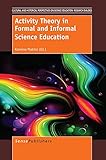Activity Theory in Formal and Informal Science Education [electronic resource] / edited by Katerina Plakitsi.
Material type: TextSeries: Cultural and Historical Perspectives on Science Education, Research DialogsPublisher: Rotterdam : SensePublishers : Imprint: SensePublishers, 2013Description: VI, 253 p. online resourceContent type:
TextSeries: Cultural and Historical Perspectives on Science Education, Research DialogsPublisher: Rotterdam : SensePublishers : Imprint: SensePublishers, 2013Description: VI, 253 p. online resourceContent type: - text
- computer
- online resource
- 9789460913174
- 370 23
- L1-991
The purpose of this book is to establish a broader context for rethinking science learning and teaching by using cultural historical activity theoretic approach. Activity theory already steps in its third generation and only a few works have been done on its applications to science education, especially in Europe. The context takes into account more recent developments in activity theory applications in US, Canada, Australia and Europe. The chapters articulate new ways of thinking about learning and teaching science i.e., new theoretical perspectives and some case studies of teaching important scientific topics in/for compulsory education. The ultimate purpose of each chapter and the collective book as a whole is to prepare the ground upon which a new pedagogy in science education can be emerged to provide more encompassing theoretical frameworks that allow us to capture the complexity of science learning and teaching as it occurs in and out-of schools. The book captures the dialogic and interactive nature of the transferring the activity theory to both formal and informal science education. It also contributes to the development of innovative curricula, school science textbooks, educational programs and ICT’s materials. As a whole, the book moves theorizing and practicing of science education into new face and uncharted terrain. It is recommended to new scholars and researchers as well as teachers/researchers.


There are no comments on this title.